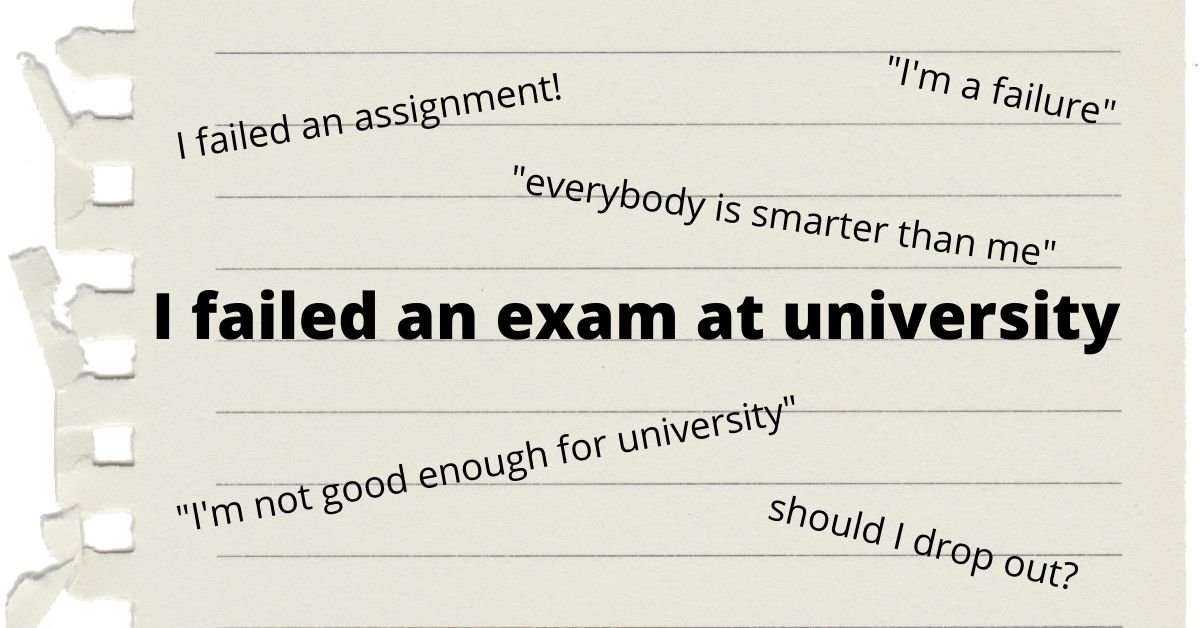Disclosure: The Graduate Samaritan is a free independent blog supported by its readers; this post may contain affiliate links that may earn a tiny commission to help the blog sustain itself, thank you for supporting this independent blog! (full disclaimer here)
How to Cope With Failure at University. Failure at university can feel overwhelming — especially when you’ve worked hard, sacrificed sleep, pushed through stress, and still didn’t get the result you hoped for.
Whether you’ve failed an exam, underperformed on an assignment, or received a grade that doesn’t reflect your effort, the emotional impact can be heavy.
You might feel embarrassed, stressed, or even afraid about what it means for your future. But here’s the truth: failing at university does not mean you are a failure.
Academic setbacks are part of the learning process, and thousands of capable, intelligent students experience them every single year. What matters is how you respond, not the setback itself.
This guide will walk you through proven, realistic and emotionally supportive strategies to help you cope with academic failure, regain clarity, and move forward with confidence
💭 Why Failure at University Feels So Overwhelming
University represents a huge transition — academically, socially, and emotionally. The expectations you place on yourself (and those you imagine others place on you) can make any setback feel far bigger than it actually is.
Students often fear disappointing their families, falling behind their peers, or jeopardising future plans.
When a bad grade arrives, these fears tend to mix together, creating a powerful emotional reaction that can make you feel defeated or unsure of your abilities. This doesn’t mean you’re weak — it means you’re human.
Academic pressure is intense, and it’s normal to feel shaken when things don’t go as planned. The key is not letting these emotions define your next move. Let’s now go through 3 steps to cope with failure at university and move forward.
🌬️ Step 1: Cool Down & Create Emotional Space to Recover
Finding out you’ve failed something at university can trigger a surge of frustration, anxiety or self-doubt, and trying to analyse the situation while emotions are high only leads to harsher self-judgement.
Before you try to “fix” anything, you need a moment to breathe, focus on calming your nervous system. Try these techniques to cool down and regain balance:
- 🧘 Step away from the situation. The worst thing you can do is stare at the grade repeatedly. Close the screen. Put the paper away.
- 🚶 Give yourself time to process. Go for a walk, take a shower, or sit outside for fresh air. A brief physical reset helps interrupt emotional spirals.
- 🎧 Distract your mind with something calming. Music, talking to a friend, playing a game, cooking — anything that grounds you.
- 💬 Avoid negative self-talk. Statements like “I’m stupid” or “I’ll never succeed” only deepen the emotional wound. You’re simply reacting to a stressful moment — not defining your future.
This cooling-off period doesn’t mean you’re ignoring the problem. You’re simply allowing your mind to settle so you can approach the situation with clarity instead of panic. When emotions calm, rational thinking returns.
🎓 Great Resource To Cope With Failure at University
🎧 Bonus Tip: Check out the latest Audible Offers — you might be surprised how much value is included! It’s a great time to explore audiobooks and podcasts, which discuss complex topics in clearer, non-academic language, making them easier to understand and less overwhelming.
👉 Our recommended pick: Failing Forward: How to Make the Most of Your Mistakes, by John C. Maxwell — a brilliant choice for anyone struggling with setbacks, self-doubt, or disappointment at university and looking to turn failure into growth.
🎧 Audible – The Ultimate Study Hack!
- 📚 Listen to Textbooks & Study Guides anytime, anywhere.
- 🧠 Boost Focus with expert knowledge and productivity podcasts.
- 🎧 Relax & Unwind with bestselling audiobooks after classes.
- 🔥 Explore New Audiobooks Every Month with your membership!
🔍 Step 2: Reflect and Understand What Happened
Once you feel calmer, shift from emotion → reflection. This is where growth happens.
The reflection phase is not about shame, nor about blaming yourself. It’s about understanding the specific factors that led to the outcome so you can plan your next move.
Reflection turns failure into information — and information helps you move forward with purpose.
📄 If You Failed an Assignment
If you struggled with an assignment, look at the feedback with an analytical mindset rather than judgemental. Review your feedback and look for patterns:
- Did you lose marks for structure?
- Was your referencing off?
- Did you misunderstand the question?
- What about depth of analysis?
If anything is unclear, email your lecturer. Ask something like “Could you clarify which areas I should focus on to improve for the next assignment?”. Be proactive, ask for a face to face meeting if necessary.
Don’t forget you can also ask your personal tutor to help you understand the feedback, and your Uni should also provide an academic writing service team.
Don’t be shy, these figures are there to help you! This shows initiative and helps you rebuild confidence.
👉 Check out our guide on How To Write An Essay at University Level.
📝 If You Failed an Exam
For exam failures, reflect on how you prepared. Ask yourself:
- Did I revise consistently or was it a last-minute rush?
- Were my revision methods passive (highlighting, rereading) instead of active (past papers, teaching material, flashcards)?
- Were my notes not detailed enough?
- Did exam anxiety affect my performance?
- Was the exam format unfamiliar?
You’re not looking for blame — you’re looking for leverage points to change next time. Understanding your revision style is one of the most important skills you’ll ever build at university.
👉 Check out our guide on How To Revise For Exam Effectively.
🗣️ Step 3: Reach Out and Seek Support
Failure feels far heavier when faced alone. Talking about it can make a surprising difference. Speaking to a friend, family member or mentor helps break that isolating feeling and reminds you that one setback doesn’t define your worth.
If the situation feels too complicated or overwhelming, academic advisors, wellbeing teams and university counsellors can offer tailored support.
Many students assume these services are only for “serious” issues, but they’re there for exactly these moments — times when you’re struggling, uncertain or simply need guidance.
Academic advisors and student wellbeing teams regularly see students struggle after setbacks — and recovery is far more common than students expect.
💬 Talk to:
- A trusted friend
- A family member
- A mentor
- Another student who’s been through it
- Your academic advisor
- A counsellor or wellbeing service
Most universities offer:
- academic skills workshops
- mental health support
- exam anxiety counselling
- time-management coaching
- study groups
- resit guidance
Seeking help isn’t weakness, it’s resilience. It shows self-awareness and the willingness to grow. It is self-advocacy — a skill every successful student must develop!
🔗 Recommended: Check Out the Best Books to Build a Successful Mindset at Uni.
🔄 Change Your Perspective on Failure
A shift in perspective can be transformative. Instead of viewing failure as a dead end, think of it as a detour — something that slows you down temporarily but gives you the chance to approach the journey with more insight.
Even high-achieving students fail. Even brilliant thinkers get things wrong. Albert Einstein famously said, “Failure is success in progress.” And he was right. You learn far more from a setback than from easy success.
Rather than comparing yourself to others, compare yourself to yesterday’s version of you. Progress isn’t linear, and university isn’t a race. What matters is that you keep moving forward.
🎓 Final Thoughts: You Are Capable, Even on Your Worst Days
Failure at university does not define your intelligence, your potential, or your future. It is a moment — not your identity. With space to breathe, honest reflection and the support of people around you, you can turn a discouraging experience into a meaningful turning point.
The fact that you’re reading this shows resilience already. Remember that setbacks shape strong students, not perfect ones. You are enough, and you have more strength than you realise.
We really hope you’ve found our guide to cope with failure at university helpful!
FAQ: Cope With Failure At University
Yes. Many students fail at least one exam or assignment during their degree. It’s a normal part of the learning process and does not reflect your long-term ability or potential.
Take time to cool down before making any decisions. Once calmer, review your exam performance, identify what went wrong, and seek guidance from your lecturer or advisor.
Talking to someone you trust can reduce shame significantly. Remember that failure is far more common than you think — most students experience it at least once.
A single failure rarely affects your overall degree prospects. Most universities offer resits, mitigation processes and support services to help you recover and succeed.
Start with reflection, create a clear plan for improvement, and celebrate small wins. Confidence grows from consistent effort and understanding, not perfection.
Useful Resources:
- NHS (mental health, stress, wellbeing)
https://www.nhs.uk - Mind UK (mental health resources)
https://www.mind.org.uk - UCAS (student guidance)
https://www.ucas.com - Gov.uk (education and student support)
https://www.gov.uk - Universities UK
https://www.universitiesuk.ac.uk
🎓 University Essentials – Everything You Need for Uni
Did you know? We’ve put together tailored student essential lists to help you through every aspect of university life!
- 📝 Student essentials: Everything you’ll need to stay prepared, productive, and comfortable during a typical Uni day.
- 💡 Accommodation essentials: Make your space feel like home (and don’t forget the stuff everyone forgets!).
- 🖥️ Study from home essentials: Tools and tips to create a distraction-free, efficient study setup.
- 🥘 Kitchen essentials: From budget-friendly basics to smart cooking tools that make life easier.
- 🎧 Coolest gadgets for university: Level up your uni experience with tech and tools students actually use.



